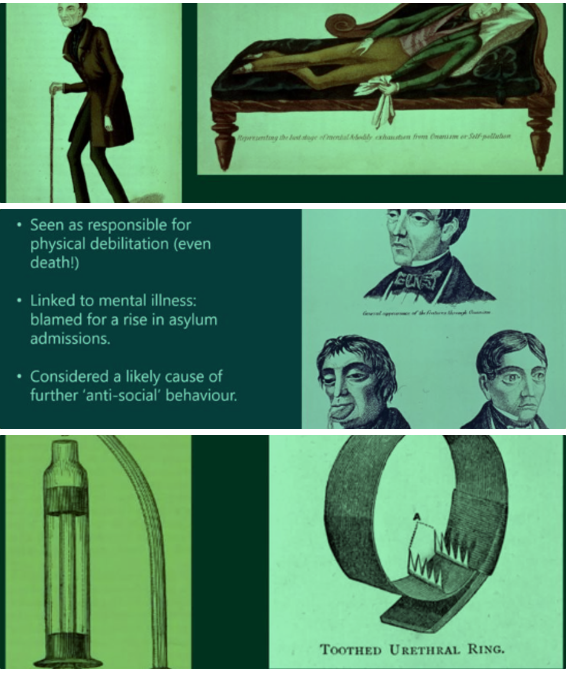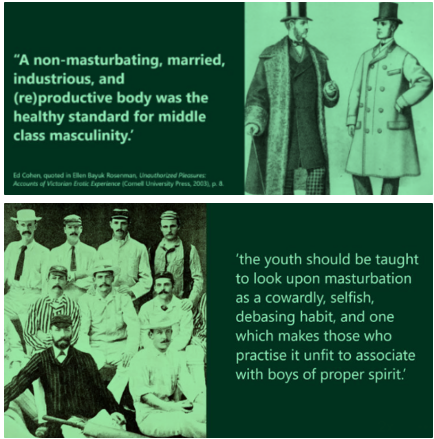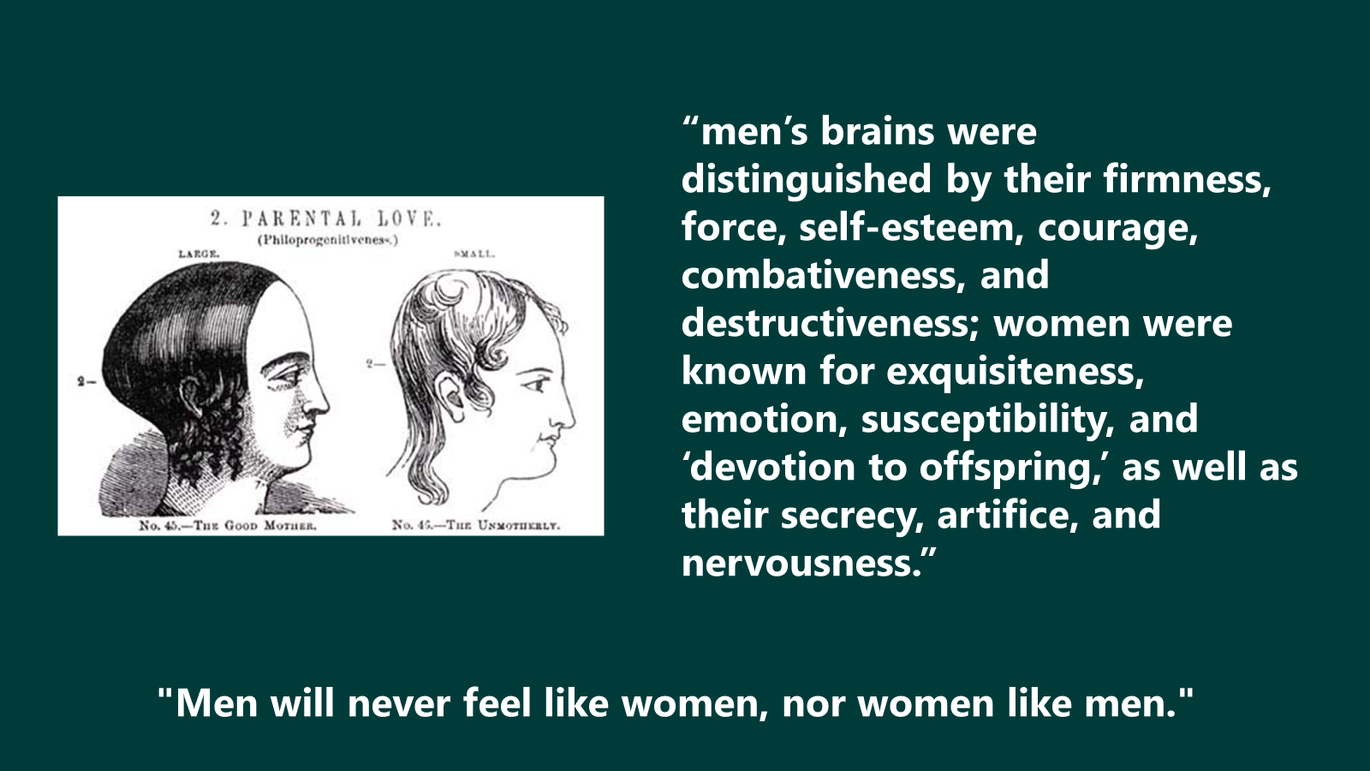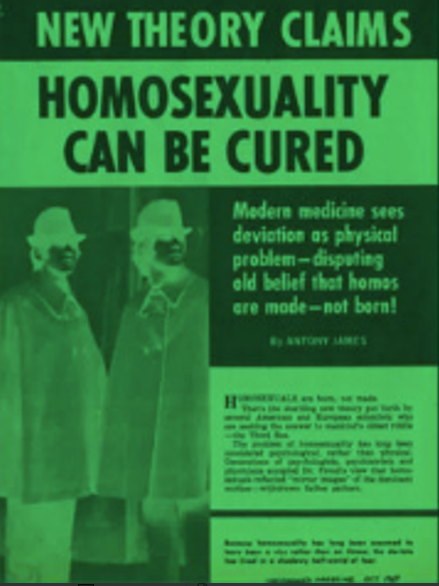Gender & Medicine
1/8
There's no tags or description
Looks like no tags are added yet.
Name | Mastery | Learn | Test | Matching | Spaced |
|---|
No study sessions yet.
9 Terms
understanding, diagnosing & treatm. disease
social-constructionist view medicine & rammifications today
Understandings disease socially-constructed, objective (🔗 objective physiology but to social constructions gender)
Culture & soc. shapes which diseases stigmatised, come w/
abilities& which are consid. ser.Shaped by bodybut socio-cultural influences
Gender (in addit. to intersecting factors like race & class) has had a profound effect on the ways in which doctors understand, diagnose & treat illness. (important factor in social construction).
(2018) 👨 often view women w/chronic pain as brave & stoic, whilst 👩 hysterial - exaggerate their pain
endimitriossi takes 8-10 yrs to diagnose
combined w/race → massive disparities medical treatm. black women’s pain
black women 4 times more likely to die in childbirth than white women
women only just made necessary to be trialed in drugs
women underrepresented in povotal trials of FDA-Approved cancer drugs
1990s: doctors didn’t know cancer looked diff. in men, same w/cancer…
pre-eclampsia more likely to affect black women
understanding, diagnosing & treatm. disease
Gender (in addit. to intersecting factors like race & class) has had a profound effect on the ways in which doctors understand, diagnose & treat illness.
New Woman
Ambition for self-developm. could à “sickness, freakishness, sterility, and racial degeneration” as many doctors of the period warned (39). In fact, they dared to associate several mental disorders such as anorexia or anxiety and physical pain related to menstruation with the changes in women’s aspirations.
- These women were often diagnosed with “female hysteria”, a common medical conclusion that “explained away any behaviors or symptoms that made men uncomfortable”
"Bicycle face": a 19th-century health problem made up to scare women away from biking - Vox
understanding, diagnosing & treatm. disease
Gender (in addit. to intersecting factors like race & class) has had a profound effect on the ways in which doctors understand, diagnose & treat illness.
Case study: masturbation
Somet. called onanism, self-abuse…
So-called problem big preoccupation for doctors - e.g. William Ackton’s The Functions & Orders of the Reproductive Organs which goes through multiple editions 1850s-20thC
Dedicated yrs their career to masturbation; most danger. thing to do that ruined lives
Effects
👓n as responsible for…
Physical debilitation (even 😵)
So taxing & strenoush → physical weakn. & ↑ susceptibility to diseases like syphilis.
→ downward spiral: fatigue, pallid skin, lack of appetite, loss of sexual appetite, inability to walk and talk, muscle atrophy, rotting bones & 😵.
Attrib. to draining life-giving semen, essential for energy & vitality (voluntary via mast./
voluntarilyvia wet dreams).Semen loss consid. v/costly to body's health, w/claims ounce semen equiv. to 40 ounces 🩸.
Negative impact on nerves:
Orgasms body
prep. for(would be within marital sex) → violent abuse body (orgasmic fits)William Acton: → orgasms ← masturbation were like nervous fits, like dying rabbit's gasps.
Mental illn. (blamed for rise in asylum admissions) & antisocial behaviour.
Veronique Mottier + Arthur Gilbert: Medical literature depicted decline ← healthy citizen → mentally capacitated.
Henry Maudsley: Prominent psychiatrist blamed masturbation for rise in asylum admissions.
→ madn. by seeking solace in oneself rather than in external relationships & work.
Associated w/phobias & suicidal/murderous tendencies.
Emphas. importance early intervention to prevent deterioration.
Treatm.
→ industry anti-masturbatory devices
toothed urethral ring - would stab your penis if you had erection in night (loss all semen bad, not just masturbation but also wet dreams…)
cauterising urethra → cause discomfort/ numb area
surgical procedures (e.g. injecting acid → perrenea), promising to make them healthier

understanding, diagnosing & treatm. disease
We know masturb. doesn’t imapct body like this…
So why did these prominent men dedicating their career to it, w/ill effects masturbation becoming key issue?
Doctors trying to make a name for themselves in medical marketplace
pre-NHS; by making up issue, make money ← treating it
doctors took fees directly ← patients
hence by creating an issue & treating it, would make oneself a reputation and lots money
Or more about gender and masculinity?
Repres. accep. chall. to Victorian masculinity (tied to notions self-control, temperance…)
(Ed Cohen) masculine ideal (espec. MC most concerned masturbation) most concerned w/self-discipline, control and continence most important, personal control, temperence…
→ masturb. (no self-control) unacceptable for these scholars
ACKTON: way out was for boys → more masculine
Treatm.
medicinalbut rather practic. self-disicpline/ sexual self-denial of rigorous exercise & well-protected phsyical health (cricket foster physical strength & healthy feeling competition) & steering clear sexual indulgence → ‘manly form’ (real men - hearty, muscular, intellectual, handsome & noble)Stop them masturbating by making them men again; chall. gender norms → affirming them
Sign. latter
Medical discussion body & mind just ignorant reaction to made-up, non-existent disease but rather attempt to use ideas ab. dangerous sex & maintenance of health to reinforce con. ideas masculinity.
as gender effects how disease and illness categorised, & what healthcare outcomes they want to achieve (what was considered a ‘cure’)

notions ‘nat.’ diff.
Medicine has played key role in marking out supposedly ‘nat.’ differences along lines factors like gender & race
why are doctors so interested in showing that diff. kidns bodies separate & distinct → playing key role in maintaining hierarchies
essentialism
notions ‘nat.’ diff.
case study: history phrenology
define
🔗gender
signif.
define
Geograpy human skull tells us/ yields info ab. brain & mental capacities person to whom it belonged
Pseudo-science but made lots money early Victorian period (1st half C19)
🔗gender
C19 American phrenologist Olson Squire Fowler
Key nat. differences bet. men and women/race could be told by feeling their heads.
👩:
less intelligent, less capable critical-thinking
smaller, weaker, more emotional (less mental force than men)
romantic, rather than sexual
loved their pets, home children → expectations motherhood read onto the body
maternal (if bump side head)
👨:
bigger skulls more sexual, women romantic
higher self-esteem
bigger bumps in better places → treated as solid proof of their superior mental faculties/ irrefutable supp. for their privileged pos. in soc.
signif.
→ phrenology shaped by assumptions ab. what men & women could should be
This pseudo-science 🎭s medicine objective reporting facts but rather way to put people into boxes → maintain hierarchies gender & race.
medicine helped define many notions ‘nat. diff.’ → sociale xper. gender = outcome biological processes (essentialism)
e.g. phrenology used to shore up existing hierarhcies & systems power

medicine & regulation sexuality
Medicine has been directly involved w/attempts to police & regulate gender & sexuality
aversion therapy
Define it & its uses
PW context
What is aversion therapy? Its uses/ history?
Medical treatm. designed to make patients averse to partic. behaviours/ desires
history aversion therapy: used to treat…
criminal activity
mental health issues (electro-shock therapy for alcoholism, schitzophrenia…)
(post WW2) emerged to ‘solve’ problems such as transvestism & homosexuality
PW context
Reinforcem. trad. values
CW context leads to backlash against sexual
Anxiety ab. 👩 in workforce bolstered idea return. to ☢ 👪 model.
Aimed to enforce trad. roles, w/👨 as breadwinners.
Emphas. on importance trad. gender roles to nat. sec.
(Matt Holdbrooke) Masculinity 🔗 nat. safety; deviation 👓n as only as
moralbut also nat. threat (e.g., McCarthy's lavender scare targeting suspected homosexuals - FC sex)
↑ auth. medicine & call to action through WR
↑ trust in doctors & scientists as group w/all answers to address social issues, includ. homosexuality.
Wolfenden Report (1950s): Paved the way for legalis. homosexuality but viewed it as medical issue, inspiring efforts to ‘cure’ sexual deviancy.
Shift ← punishm. → ‘cure

medicine & regulation sexuality
Medicine has been directly involved w/attempts to police & regulate gender & sexuality
aversion therapy
Techniques
Effectiven.& harmSignif.
Techniques
Some ATs ‘low-tech’ - use ‘chem.’ approaches instead
Common to use emetics & hormones, alongside audio, video & images
Dr. Basil James: Claimed 100% cure of homosexuality using aversion therapy w/emetics, brandy, and audio-visual reinforcement over extensive sessions.
(← 1960s) ↑ amount machine-based aversion therapy (inc. electro-shock treatm.)
Painful shocks to hands, feet, legs, penis for hours over weeks.
(Dona Drucker) Documented development of shock therapy wi/penile strain gauge, increasing use of technology to distance doctors from patients.
cuff put around penis → electric shock when reacted to stimuli (assoc. it w/pain or discomfort to train them out of it)
increasing use tech. put more distance bet. doctors and patients - didn’t have to be in same room; could adminsiter the shocks ← another room at comfy distance as machine administered shocks
Design. to ‘train out’ reactions deemed a deviation ← heterosexual norm.
Universally effective
Some patients report adverse effects - many exper. physical & mental trauma.
Created fear of attraction/sex rather than elim. homosexuality.
Dr. John Bancroft: Reported cases of severe mental trauma, physical pain, and distress.
Examples: Phobias, suicide attempts, depression, inability to form relationships, celibacy.
1 developed phobia attractive men & attempted suicide; anoth. → aggressive, unable to obtain orgasm & attempted suicide too; 1 → psychotically depressed where wandered into street remov. his clothes; 1 → so disillusioned w/sexuality in gen. he could no longer sustain emotionally rewarding relationships & settled for celibacy
(yrs after treatments) soem patients recorded long-lasting mental trauma, physical pain & distress
Effects soon wear off. No method emerges that succ. ‘cures’ homosexuality, tranvestism, etc.
some patients recorded being cured for ab. 3 months
vast majority reported
change to their desires/ behaviours whatsoever
Signif.
Reflected societal attempts to enforce conformity to gender norms & deal w/refusal to confirm, with doctors → key figures addressing non-conformative behaviors & desires.
medicine responsible for policing & regulating gender & sexuality in many diff. ways (import. regulatory role)